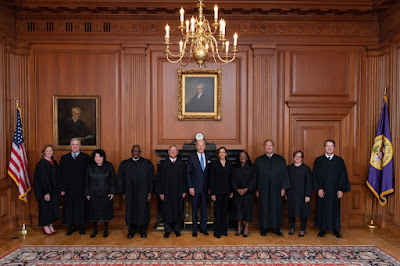 |
| Women's rights protected for now. Supreme Court sides with company that makes mifepristone. |
We await so many controversial decisions from the U.S. Supreme Court under Chief Justice John Roberts.
Today's decision is a small victory for women's rights but it's not the end of it. The far right will figure out ways to ban women rights.
In an unanimous decision, the Court said that mifepristone, a safe tablet that is used for safe termination is allowed. The right to privacy and public access were on the line if the six conservative justices voted against it. This would have put distributors and workers out of business if they ruled against it.
The court found unanimously that the group of anti-abortion doctors who questioned the Food and Drug Administration’s decisions making it easier to access the pill did not have legal standing to sue.
Justice Brett Kavanaugh, writing for the court, wrote that while plaintiffs have "sincere legal, moral, ideological, and policy objections to elective abortion and to FDA's relaxed regulation of mifepristone," that does not mean they have a federal case.
The plaintiffs failed to show they had suffered any injury, meaning that "the federal courts are the wrong forum for addressing the plaintiffs' concerns about FDA's actions," he added.
"The plaintiffs may present their concerns and objections to the president and FDA in the regulatory process or to Congress and the president in the legislative process," Kavanaugh wrote. "And they may also express their views about abortion and mifepristone to fellow citizens, including in the political and electoral processes."
The legal challenge was brought by doctors and other medical professionals represented by the conservative Christian legal group Alliance Defending Freedom.
"We are disappointed that the Supreme Court did not reach the merits of the FDA’s lawless removal of commonsense safety standards for abortion drugs," said Erin Hawley, one of the group's lawyers. She told reporters she is hopeful the underlying lawsuit can continue because three states — Idaho, Missouri and Kansas — have brought their own claims and have different arguments for standing.
By throwing out the case on such grounds, the court avoided reaching a decision on the legal merits of whether the FDA acted lawfully in lifting various restrictions, including one making the drug obtainable via mail, meaning the same issues could yet return to the court in another case.
Another regulatory decision left in place means women can still obtain the pill within 10 weeks of gestation instead of seven.
Likewise a decision to allow health care providers other than physicians to dispense the pill will remain in effect.
The ruling comes two years after the court, which has a 6-3 conservative majority, overturned the landmark abortion rights decision Roe v. Wade, which led to a wave of new abortion restrictions in conservative states.
Then, the court suggested it was removing itself from the political debate over abortion, but with litigation continuing to rage over abortion access, the justices are continuing to play a pivotal role.
Abortion rights supporters welcomed the ruling, with Nancy Northup, president of the Center for Reproductive Rights, saying she was relieved at the outcome but angered about the case lingering in the court system so long.
"Thank goodness the Supreme Court rejected this unwarranted attempt to curtail access to medication abortion, but the fact remains that this meritless case should never have gotten this far," she said in a statement.
Danco Laboratories, manufacturer of Mifeprex, the brand version of mifepristone, praised the ruling too, saying it was good for the drug approval process writ large.
Mifepristone is used as part of a two-drug FDA-approved regimen that is now the most common form of abortion in the United States.
Abortion is effectively banned altogether in 14 states, according to the Guttmacher Institute, a research group that backs abortion rights.
The FDA had the backing of the pharmaceutical industry, which has warned that any second-guessing of the approval process by untrained federal judges could cause chaos and deter innovation.
Last year, Texas-based U.S. District Judge Matthew Kacsmaryk issued a sweeping ruling that completely invalidated the FDA’s approval of the pill, leading to panic among abortion-rights activists that it would be banned nationwide.
The Supreme Court last April put that ruling on hold, meaning the pill remained widely available while litigation continued.
The New Orleans-based 5th U.S. Circuit Court of Appeals in August then narrowed Kacsmaryk’s decision but left in place his conclusion that the FDA’s move to lift restrictions starting in 2016 was unlawful.
Both sides appealed to the Supreme Court. The court in December took up the Biden administration’s appeal in defense of the later FDA decisions, but it opted against hearing the challenge to the original approval of mifepristone in 2000.
The Supreme Court focused solely on the later FDA action, including the initial 2021 decision that made the drug available by mail, which was finalized last year.
No comments:
Post a Comment